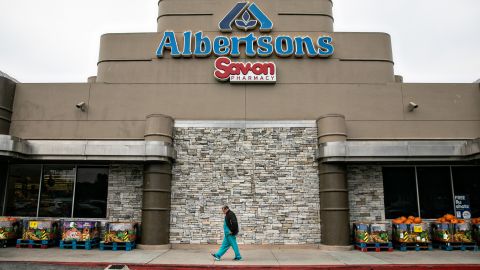New York
CNN Business
—
In a mega-deal that could have a major impact on grocery stores in the U.S., Kroger and Albertsons announced plans to merge on Friday.
If approved by regulators, the nearly $25 billion deal would be one of the largest in U.S. retail history.
The proposed merger, which the companies expect to complete by 2024, would combine the country’s fifth- and tenth-largest retailers. The companies own dozens of chains, including Safeway, Vance, Harris Teeter and Fred Meyer, and reach 85 million households.
Kroger
(KR) and Albertsons, both of which employ mostly union workers
(WMT)Amazon
(AMZN)and Costco
(cost). Grocers are also looking forward Increased pressure from AldiA fast-growing German discount supermarket chain.
However, there is no guarantee that the deal will go through.
The merger will face intense scrutiny from the Federal Trade Commission and other regulators. Opponents, Sen. Bernie Sanders and Elizabeth Warren have already called on regulators to block the deal. Companies say they sell hundreds of stores in contiguous locations to get regulatory approval.
Here’s how mega-merger could affect grocery shopping in America.
Price gouging at the grocery store is a big concern for shoppers right now.
Grocery products increased 13% in September from last year, the fastest pace in decades.
The companies say the deal could save them $500 million in costs. They will invest $1.3 billion in Albertsons, including cutting prices.
“Our expanded portfolio, along with more personalized promotions and benefits, will help customers save … and help relieve inflationary pressures facing shoppers across the country,” Kroger CEO Rodney McMullen said Friday.
Albertsons stores are heavily concentrated on the West Coast, while Kroger dominates the Midwest.
Albertsons has higher prices than Kroger and other grocers, analysts say, and they predict that Kroger will try to lower Albertsons’ prices to be more competitive against discount chains such as Aldi.
“This deal will provide consumers with some food price relief,” said Ken Fenyo, retail analyst at CoreSite Research. “With Aldi, Lidl and other discount grocers coming in, this positions Kroger to drive the market forward.”
But supermarket tie-ups can lead to higher prices for shoppers.
A 2012 study A study published in the Journal of Economics and Management Strategy found that “mergers in the supermarket sector lead to significant increases in consumer prices and thereby harm to consumers.”
The study found that mergers in less concentrated markets are often associated with price reductions.
Antitrust advocates say the merger would drive out competition, concentrate power among the biggest chains and drive up prices.
“A Kroger-Albertons deal will squeeze consumers who already struggle to afford food,” said Sarah Miller, executive director of the American Economic Freedom Project, a policy group opposed to concentrated economic power.
Kroger and Albertsons have each developed their own formulation Own exclusive food brands Alternative to big name brands in recent years.
Kroger, for example, offers its own brands such as Private Choice and Simple Truth, while Albertsons has O Organics, Open Nature, and others.
Both companies’ brands generated $43 billion in combined sales last year.
This is an important strategy for these stores because it is more profitable to sell their own brands than national labels, and it helps keep the prices of the big brands under control.
By merging, the companies plan to expand their own brand selection and lower production costs.
Grocery stores are shrinking in America.
The number of American grocery shoppers has declined by about 30% from 1993 to 2019. Report Last year Food and Water Watch, a consumer advocacy group.
Analysts say Kroger and Albertsons are likely to close some of their overlapping stores in some of the cities where they are most concentrated, such as Los Angeles and Chicago.
“If a merger happens, there will no doubt be some closures,” said Neil Sanders, an analyst at Global Data Retail. “Over time, the rate of closures could be higher as the combined chains seek to reduce duplication,” he said.

Analysts and advocates say a merger would make it harder for smaller grocers and mom-and-pop stores to stay in business.
The National Grocers Association, which represents small retailers and wholesalers, said the merger would put smaller competitors at an “unfair disadvantage” and increase “anti-competitive buyer power over grocery suppliers.”
This will disproportionately affect cities and rural areas, where independent shops are usually located.
“This deal will certainly put black and Latino neighborhoods in more rural towns and cities at risk of becoming ‘food deserts’ as more local grocers are put out of business,” said Stacey Mitchell. Reliance is a research and advocacy organization that challenges economic concentration.
The food industry has consolidated in the United States in recent decades.
The top five grocers — Walmart, Kroger, Costco, Ahold Delhaize and Amazon — control half the market, according to UBS.
A Kroger-Albertsons merger could trigger a wave of new mergers and acquisitions as the companies seek to keep up, analysts predict.
The proposed deal “accelerates the continued consolidation of the sector,” said UBS retail analyst Michael Lazer.
Amazon “has ambitions to be big in the space,” he said. “Warehouse clubs, hard discounts, strong [regional grocers] And special players will try to strengthen their positions.

“Total coffee junkie. Tv ninja. Unapologetic problem solver. Beer expert.”
